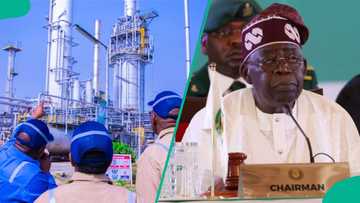N70,000 Minimum Wage: States’ Salaries Increased by 90% to N3.8 Trillion, Breakdown Emerges
- The personnel cost for state civil servants has risen from N2.036tn in 2024 to N3.87tn in the approved 2025 budget, marking a 90.23% increase
- At least 27 states are now unable to pay workers' salaries without federal allocations due to the increment in the minimum wage bill and rise in political appointments
- According to data obtained from a BudgIT-backed website, Lagos recorded the highest increase in personnel costs, rising from N225.114bn to N401.12bn, while Niger followed suit
CHECK OUT: Education is Your Right! Don’t Let Social Norms Hold You Back. Learn Online with LEGIT. Enroll Now!
Legit.ng journalist Esther Odili has over two years of experience covering political parties and movements.
The amount budgeted for personnel costs, including salaries and allowances to state civil servants, has increased from N2.036 trillion spent in 2024 to N3.87 trillion in the approved 2025 budget.

Source: Facebook
According to its budget implementation report, although the 36 sub-national allocated a total sum of N2.8 trillion as salaries costs, it only paid out a total of N2.036tn within the 12 months as of 2024, a reduction of N764 billion.

Read also
Fidelity Bank gets approval to proceed with second phase of its capital-raising initiatives
According to data obtained from the 2025 approved budget of the 36 state governments, the increase in personnel costs is attributed to the implementation of the N70,000 new minimum wage and a rise in political appointments, which reflected an increase of nearly 90.23%.
Salaries increase across each state
Meanwhile, the substantial increase in salaries and allowances across various states has introduced a new set of challenges.
In a detailed examination of the salary increases across each state, the largest increase came from Lagos, which saw its personnel costs more than double, from N225.114 billion to N401.12 billion.
With the sharp rise in personnel costs, only 9 out of the 36 state governments of the federation can independently pay their workers’ salaries without depending on federal allocations.
The states with robust internal revenue are Lagos, Abia, Benue, Enugu, Ogun, Niger Kaduna, Kwara, and Osun.
According to the analysis of the budget data, 27 states cannot fund salary payments from their internally generated revenue without relying heavily on federal allocations from the Tinubu-led central government or borrowing from banks and related institutions.
The development also means that the respective wage bills of the affected states surpassed their various IGRs, raising concerns about workers’ productivity and state governments’ efficiency in internal revenue generation.
Breakdown of the salary rise across states
An in-depth analysis of the budget document revealed significant variations in personnel costs across states: 20 states saw an increase in personnel expenses exceeding 50 per cent, while 16 states experienced a more modest rise, with salary increases remaining below the 50 per cent threshold.
Abia approved a notable increase in its personnel costs, with an escalation from N33.045bn to N77.34bn.
Similarly, Adamawa’s personnel cost rose from N48.61bn to N74.23bn.
In Akwa Ibom state, a sharp surge from N91.74bn to N126.69bn was approved.
Anambra state, led by Governor Charles Soludo, also approved a significant rise from N34.001bn to N63.41bn.
Bauchi followed suit, with an increase from N42.29bn to N70.41bn while Bayelsa saw its personnel costs climb from N60.18bn to N114.21bn.
In Cross River, the personnel cost grew sharply from N35.02bn to N106.12bn, one of the highest among the states.
Delta also recorded a notable surge in its expenditure from N139.999bn to N185bn and Ebonyi witnessed an increase from N23.076bn to N36.66bn.
Edo personnel cost also grew from N74.58bn to N101.29bn, while Ekiti registered a substantial rise from N30.69bn to N62.51bn, almost doubling its personnel cost.
Enugu also saw a substantial rise from N47.988bn to N70.954bn.
However, Gombe saw a negligible decrease in personnel costs, falling from N40.52bn to N40.28bn.
On the other hand, Imo saw an upward trend from N41.92bn to N67.4bn.
Jigawa also experienced a jump from N51.445bn to N90.73bn, an increase of 76.4 per cent, while Kaduna’s personnel costs grew by 23.4 per cent from N68.010bn to N83.94bn.
Kano, emerged with one of the largest increases in this analysis, as its personnel costs skyrocketed from N89.97bn to N150.996bn.
Interestingly, Katsina, saw an increase from N29.69bn to N58.62bn while in Kogi, the personnel budget grew from N64.798bn to N109.96bn.
Kwara followed a similar trend, rising from N51.045bn to N69.152bn but the largest increase came from Lagos, which saw its personnel costs more than double, from N225.114bn to N401.12bn.
In Nasarawa, personnel costs increased from N48.704bn to N80.456bn, while Niger recorded an even larger leap, from N25.36bn to N104.301bn.
Ondo's personnel cost grew from N75.96bn to N139.726bn, while Osun also registered a significant rise from N55.571bn to N102.89bn.
Oyo experienced a massive increase, with personnel costs rising from N116.207 bn to N214.116bn, an 84.3% increase.
Similarly, Plateau saw its personnel expenditure climb from N38.963bn to N67.144bn, marking a 72.5% increase.
Rivers state, under Governor Siminalayi Fubara, recorded a staggering rise from N167.05bn to N343.196bn, a 105.6% increase.
Sokoto also saw a substantial increase, from N55.32bn to N64.711bn, a 17% rise.
Taraba experienced a significant increase from N36.319bn to N95.23bn, a 162% rise, while Yobe recorded a 34% increase, growing from N47.95bn to N64.12bn.
Zamfara saw a moderate increase, with personnel costs rising from N34.21bn to N58.38bn, a growth of 70.7%.
The Punch confirmed the report in its publication on Monday, February 10.
Read more about minimum wage, 2025 budget:
- Minimum wage: Actual amount Tinubu allocates for Nigerian workers salary in 2025 budget disclosed
- “Oyo ranks 3rd”: List of states paying highest minimum wage in Nigeria emerges
FG discloses date states implement new minimum wage
Earlier, Legit.ng reported that the federal government assured Nigerian workers of the implementation of the newly approved national minimum wage.
FG assured organised labour that states would implement the wage starting from January 2025, thereby appealing to workers to exercise patience.
Minister of Labour Muhammad Dingyadi made the plea and gave the assurance on Thursday during a meeting with members of the Association of Senior Civil Servants of Nigeria (ASCN).
Proofreading by Nkem Ikeke, journalist and copy editor at Legit.ng.
PAY ATTENTION: Сheck out news that is picked exactly for YOU ➡️ find the “Recommended for you” block on the home page and enjoy!
Source: Legit.ng







